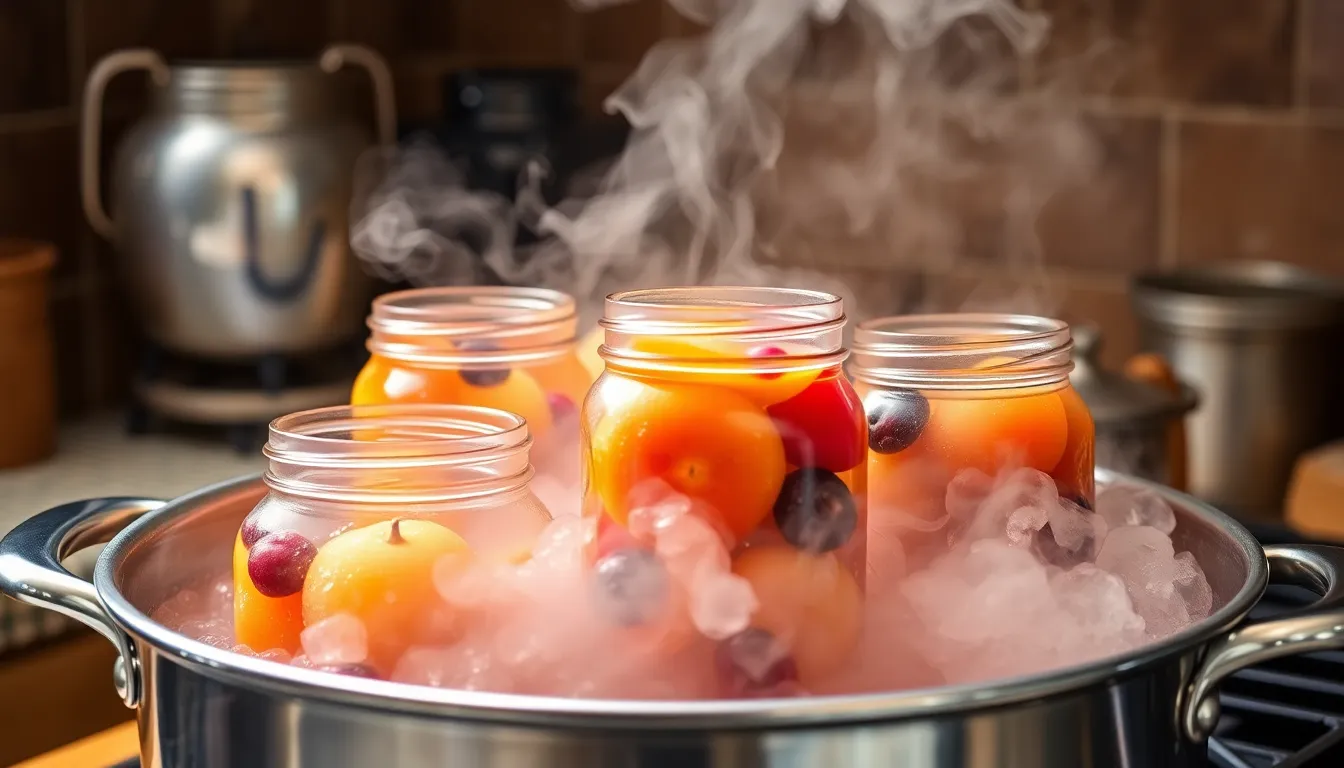Table of Contents
ToggleCanning might seem like a daunting task reserved for the culinary elite, but it’s actually a fun and rewarding way to preserve your favorite foods. Picture this: you’ve just harvested a bounty of fresh tomatoes, and you want to turn them into delicious salsa that’ll make your friends green with envy. But wait! Before you dive into the canning process, there’s one crucial step that can make or break your efforts—boiling those jars.
Understanding Canning Basics
Canning preserves food, including vibrant tomatoes transformed into flavorful salsa. Understanding the essentials ensures successful results.
Importance of Proper Canning Techniques
Proper canning techniques maintain food quality and safety. Using appropriate jars and lids prevents spoilage. Following established recipes guarantees optimal processing times. Sterilization of jars eliminates harmful bacteria. Sealing jars correctly prevents air entry, which leads to food spoilage. Measuring ingredients accurately enhances flavor and texture. Enthusiasts who adhere to these guidelines experience a successful canning process.
Safety Considerations in Canning
Safety plays a crucial role in the canning process. Botulism poses a significant risk without proper procedures. Checking the acidity of food prevents bacterial growth. Using pressure canners for low-acid foods ensures safety. Always following time guidelines aids in killing pathogens effectively. Avoiding shortcuts protects both health and quality. Proper storage of jars after sealing reduces spoilage risks. Prioritizing these safety measures results in delicious preserved foods.
How Long to Boil Jars for Canning

Boiling jars is essential for safe canning. It’s crucial to follow the correct boiling times to ensure the jars are adequately sterilized.
Standard Boiling Times
Standard boiling times vary based on jar size and contents. For pint jars, a boiling duration of 10 minutes is typically sufficient. Quart jars, on the other hand, require around 15 minutes for effective sterilization. These times apply to jars filled with high-acid foods such as fruits and tomatoes. However, low-acid foods like vegetables and meats often necessitate longer boiling or pressure canning for safety. The recommended practices ensure that harmful bacteria are destroyed, allowing for safe food preservation.
Factors Affecting Boiling Duration
Several factors influence boiling duration. Elevation plays a significant role; higher altitudes may require an extended boiling period due to lower atmospheric pressure. Jar size also impacts how long to boil; larger jars retain heat differently than smaller ones, affecting sterilization. Additionally, the contents of the jar matter; dense foods might need longer periods to reach appropriate temperatures throughout. Monitoring these variables ensures proper safety during the canning process, leading to successful food preservation with minimal risk.
Preparing Jars for Canning
Preparing jars correctly is crucial for safe canning. Proper cleaning and sterilization minimize the risk of contamination.
Cleaning and Sterilizing Jars
Start by washing jars in hot soapy water. Rinse each jar thoroughly to remove all soap residue. Next, place the jars in a large pot of simmering water. Allow them to remain submerged for at least 10 minutes for effective sterilization. Alternatively, use a dishwasher set on a hot cycle if it’s available. Distilled vinegar can help clean stubborn residues. Always check for cracks or chips before using jars, as these imperfections can lead to breakage during processing. Ensuring jars are clean and sterile lays the foundation for successful food preservation.
Choosing the Right Jars for Canning
Use jars specifically designed for canning to ensure safety. Standard canning jars come in various sizes, including pint and quart. Each size serves different preserving needs, with pint jars suitable for sauces and quart jars ideal for whole fruits. Look for jars with straight sides; these facilitate easy removal of contents. Wide-mouth jars are handy for items like pickles and preserves, as they allow easier filling and cleaning. Additionally, ensure lids fit securely to prevent leaks. Selecting appropriate jars contributes to a successful canning experience, as non-canning jars may shatter or compromise food safety.
Common Mistakes to Avoid
Canning requires attention to detail. Several mistakes can jeopardize food safety and quality during the boiling process.
Overboiling vs. Underboiling
Overboiling jars leads to nutrient loss and could result in compromised flavors. Achieving the correct boiling duration ensures optimal preservation. For pint jars, ten minutes suffices, while quart jars require fifteen minutes for high-acid foods. Underboiling presents risks as well. Insufficient boiling may not eliminate bacteria effectively, leaving food unsafe. Check specific food guidelines to determine the exact boiling times to maintain freshness.
Ignoring Sterilization Steps
Sterilization is crucial for safe canning. Neglecting proper sterilization may expose jars to harmful bacteria and spoilage. Wash jars in hot soapy water first. Rinsing thoroughly follows to eliminate soap residue. Use simmering water for ten minutes to achieve effective sterilization. Consider using a dishwasher on a hot cycle for convenience. Always inspect jars for cracks or chips before use, as damaged jars compromise safety and integrity.
Boiling jars for canning is a crucial step that ensures food safety and quality. By adhering to the recommended boiling times for different jar sizes and contents, canners can effectively eliminate harmful bacteria. It’s essential to consider factors like elevation and jar density to achieve optimal results.
Preparing jars properly and avoiding common mistakes can significantly enhance the canning experience. With the right techniques and attention to detail, anyone can enjoy the rewards of home-canned foods. Embracing these practices not only preserves the flavors of fresh ingredients but also contributes to a healthier and more sustainable lifestyle.







